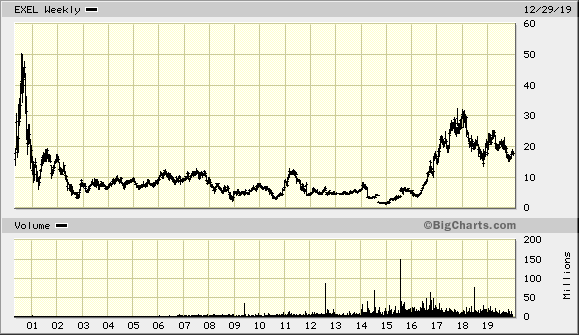Equity Analysts Karen Andersen, CFA and Stefan Quenneville, CFA of Investment Research Firm MorningStar issued a research report called ”Pricing Concerns in Pharma and Biotech Industries Creates Some Buying Opportunities and updated star rating on Exelixis, Inc.(NASDAQ:EXEL)
According to the report ”Exelixis is best known for its R&D prowess for discovering targeted cancer drugs, which has resulted in a pipeline of oncology products partnered with multiple Big Pharma players. The firm has evolved from being a discovery platform to focusing primarily on its lead product, Cometriq, which has shown robust activity in various tumor types and gained approval in the limited medullary thyroid cancer market in 2012. However, Cometriq’s failure in its Phase III program in the much larger metastatic castrate-resistant prostate cancer indication increases the uncertainty in the potential for the drug to become a significant oncology franchise. Nevertheless, the company recently reported positive Phase III results in metastatic renal cell carcinoma and has another trial ongoing in advanced hepatocellular carcinoma, which, if successful, could allow the drug to achieve peak annual sales around $1 billion.
Exelixis, Inc.(NASDAQ:EXEL) is a biopharmaceutical company committed to developing small molecule therapies for the treatment of cancer. Exelixis is focusing its development and commercialization efforts primarily on cabozantinib, its wholly-owned inhibitor of multiple receptor tyrosine kinases. Another Exelixis-discovered compound, cobimetinib, a selective inhibitor of MEK, received its first regulatory approval in Switzerland and is being evaluated by Roche and Genentech (a member of the Roche Group) in a broad development program under a collaboration with Exelixis.
Equity Analysts Karen Andersen, CFA and Stefan Quenneville, CFA continued ”Exelixis 1Q Results as Expected; Key Phase III Results Expected Mid-Year 01 May 2015 Following in-line first-quarter results, we are maintaining Exelixis’ fair value estimate of $2.70 per share and our nomoat, stable trend rating. After the failure of the Cometriq.
 |
Phase III trial in prostate cancer, the company’s future rests primarily on the results of the drug’s ongoing Phase III study in metastatic renal cell carcinoma, which should report results around mid-year. Given the binary nature of the clinical trial and the company’s dwindling cash reserves, Exelixis faces an increasingly uncertain future.
On September 25 EXEL announced positive results from METEOR, the phase 3 pivotal trial comparing cabozantinib to everolimus in 658 patients with renal cell carcinoma (RCC) who have experienced disease progression following treatment with a VEGF receptor tyrosine kinase inhibitor (TKI). In July 2015, Exelixis disclosed that the trial met its primary endpoint, demonstrating a statistically significant increase in progression-free survival for patients in the cabozantinib arm. Principal investigator Toni K. Choueiri, M.D. will present detailed data from the late-breaking METEOR abstract (#4-LBA) on Saturday, September 26, during the Presidential Session I at the European Cancer Congress (ECC) 2015, which is being held September 25-29 in Vienna. The METEOR data and an accompanying editorial were also published today in The New England Journal of Medicine.
As announced in July, the METEOR trial met its primary endpoint of demonstrating a statistically significant increase in progression-free survival (PFS) for cabozantinib as compared to everolimus, as determined by an independent radiology committee. Per the trial protocol, the primary analysis was conducted among the first 375 patients randomized to ensure sufficient follow up and a PFS profile that would not be primarily weighted toward early events.
The median PFS was 7.4 months for the cabozantinib arm versus 3.8 months for the everolimus arm, corresponding to a 42% reduction in the rate of disease progression or death for cabozantinib as compared to the everolimus arm (hazard ratio [HR]=0.58, 95% confidence interval [CI] 0.45-0.75, p<0.001). Cabozantinib effects were favorable across patient stratification subgroups including the number of prior VEGF receptor TKI therapies and commonly applied RCC risk criteria developed by Motzer et al.
